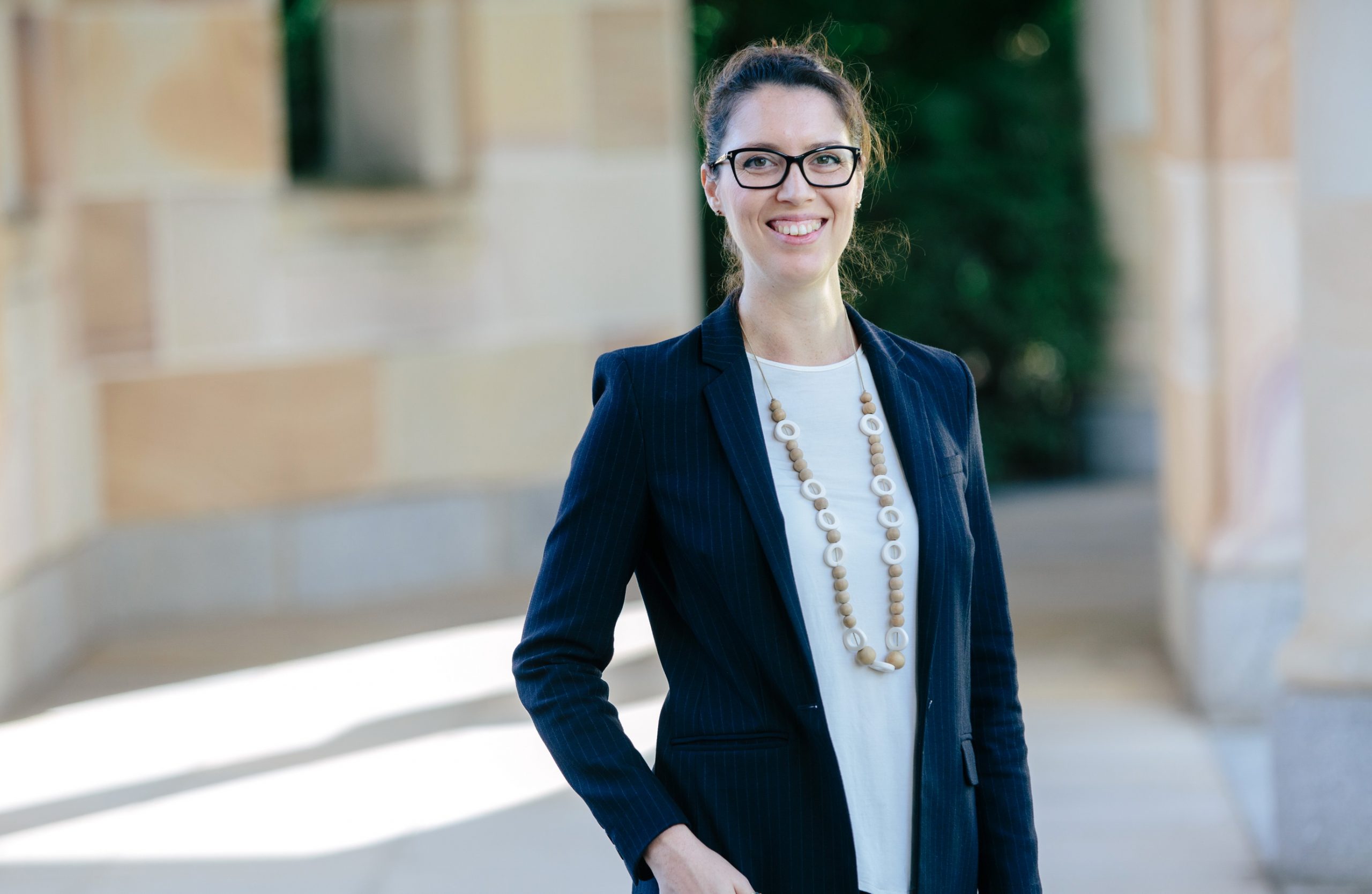
Name: Rebecca Ananian-Welsh
Where you work: The University of Queensland Law School
How long have you been working in the social sciences?
Ten years. I left legal practice to start my PhD at UNSW Law in 2010 and started my first full-time academic position as a Lecturer at UQ Law in 2014.
What does your work week look like?
I had my first period of sabbatical planned for Semester 1 2020. With the COVID-19 pandemic those plans went out the window. Instead, I have genuinely enjoyed being home and having the time to dig deep into research and writing – albeit whilst looking after my two young kids.
Since late 2018 my primary research project has been a collaboration with Prof Peter Greste and Dr Richard Murray (UQ School of Communications and Arts) examining the impact of national security laws on press freedom. Last year we made incredible progress in our research, especially once the AFP raids on the ABC and News Corp journalist Annika Smethurst thrust press freedom into the limelight. Despite having some mid-year leave planned, my winter was spent taking advantage of that unexpected interest and opportunity by engaging in media interviews, guest lectures and press freedom events across the country. Simultaneously, our research fed into two sizable submissions to Parliamentary Inquiries on press freedom, raising the prospect of harnessing our research to directly impact policy and law reform.
After a staggeringly research- and engagement-intensive year, it has been an unexpected pleasure to spend these months of COVID-19 lockdown at home, quietly digging through transcripts, statutes, scholarship and research data and spending long hours writing. For me, this also means staying on top of developments in case law, including the outcomes of challenges by Annika Smethurst and the ABC to last year’s AFP Raids. Come Semester 2 I will be teaching a Masters course in Law, Terrorism and Human Rights for a fantastic mixed cohort of law and international relations students. But thankfully my (failed) sabbatical delayed my need to transition my teaching to the world of online learning platforms just yet. So the current lock-down has had moments of feeling like a writing retreat, when it doesn’t feel like a chaotic day care centre.
What do you like most about the type of research you do?
Public law controls the power dynamics of government and society, but how many Australians really understand it? Courts resolve our disputes, and judges interact with citizens on a daily basis, but why do they enjoy such power and how can we tell when they exceed that power? We rely so heavily on an independent media for information, how should press freedom be protected, if at all?
My research offers the opportunity to grapple with tricky, maybe unresolvable, questions like when and how civil liberties and democratic rights should be sacrificed for national security (something COVID-19 has all of us thinking sometimes). I enjoy my field of research because it is challenging and complex, but directly relevant to people’s lives and to the fundamental powers that can make a place comfortable or horrific to live in.
These questions aren’t simply theoretical, they need to be answered, lines need to be drawn when each new piece of national security legislation is drafted. Should we strip Australian citizenship of ISIS fighters? When should whistleblowers who leak classified documents be punished? The government has its own interests and responsibilities, particularly to keep us safe. I feel like my research can feed into a broader dialogue of accountability, balance, and democratic rights protection, so that the laws that keep us safe don’t unnecessarily compromise the basic respect for civil liberties that is Australia’s strength. For me, combining these interests in considered, complex legal analysis with broader impact means writing not only long-form journal articles, but op-eds and media interviews too. And I find there is nothing that hones an argument or reveals is weaknesses quite as quickly as having to distil it down to a few key points for a general audience.
What’s the weirdest fact you’ve come across in your research?
Law stories tend to be long and involved, rather than quick data grabs, but the entire Tim Carmody affair was one weird turn after another. From Carmody declaring himself not to be the smartest lawyer in the room just before his appointment as Queensland’s Chief Justice, to judges recording heated conversations with him, to the stress and chaos that took over the internal workings of the Supreme Court under Chief Justiceship, until he announced his resignation in an exclusive interview with The Australian saying he would require ‘just terms’. I collaborated with Profs Andrew Lynch and Gabrielle Appleby on ‘The Tim Carmody Affair: Australia’s Judicial Crisis’ not long after having my first child, however the saga was so jaw dropping the manuscript basically wrote itself.
Some laws are jaw-dropping in themselves. The Newman Government in Queensland introduced a raft of bikie laws, including the ridiculously titled Vicious Lawless Associations Disestablishment Act (the ‘VLAD Act’). One thing they criminalised was three people being together in public wearing insignia belonging to certain bikie gangs. This offence is punishable by minimum of six months imprisonment.
What can you be found doing outside of work?
Lego and using my kids as an excuse to ride extra public transport and generally do kid stuff.
What is the one thing you cannot resist?
Going overboard at yum cha.
Favourite meal?
Hand-pulled noodles with chilli oil.